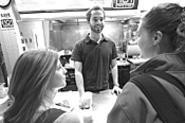He didn't actually have any food experience, mind you, but he owns a quality common to good entrepreneurs: a blindness to the insurmountable. He'd saved money from a paper route, done freelance work rehabbing homes. More important, he came from a family with seven children that survived on a social worker's salary. It blessed him with an abiding faith in peasant economics. "I was very frugal," he says. "I have a lot of the traits you usually find in Depression Era individuals."
Eight years later, Café 101 is a solid business. The kid, it turns out, had succeeded where so many others had failed. Spend an hour with McNulty, and it's easy to see why.
His place isn't much to look at. It's a basement, after all -- cavernous, sparse, painted in burnt oranges and yellows. The draw is the big sandwiches, congenial service, $1 beer -- and, of course, McNulty.
His is the voice of earnestness and warmth; he speaks fluently of both drywall and economics. But try holding a conversation with him, and you'll find yourself faced with serial interruptions as customers stop by to shake hands, share a laugh, talk of this and that. He has the gift of most small, successful restaurateurs: People come not just for the food, but to be near a man they like.
Yet Cleveland State, like any university, is a bureaucracy incapable of seeing such intangibles. Its vision is restricted to numbers in red and black. And its numbers say McNulty's gotta go. So the school recently told him his lease would not be renewed; he had three weeks to sweep up and be gone.
It was a curious decision, to say the least. McNulty's café is small, nimble, and self-sustaining. He pays $16,000 a year in rent. The seven other food-service sites on campus are run by Aramark, a multinational with $9.4 billion in sales last year. But since the company is large, inefficient, with mountains of overhead, it requires a school subsidy of $100,000 a year.
Yep, you heard that right: The little guy pays his own way, and the billion-dollar company gets welfare. Chalk it up to the peculiar nature of modern economics, where up is down and right is wrong. So the school, quite naturally, wants to give McNulty's space to Aramark.
Playing the Bad Guy in this episode will be Gary Meszaros, CSU's director of auxiliary services. He's an economics professor, a man of numbers. He believes that by booting out his paying tenant, he'll be able to reduce the subsidy to his welfare queen. It may sound backward, but the net trade is a better deal for CSU. Or so he thinks. "We're hoping it happens, but we'll see."
It's hard to blame the guy. Though the bright lights in Columbus bleat about turning Ohio into an intellectual powerhouse, they treat their universities like unwanted stepchildren, handing out nickels and expecting a dollar in change. Being broke does strange things to your mind. Suddenly, the immediate score -- no matter how absurd -- always looks pleasing. Long-term thinking is a luxury.
Yet this has long been the curse of CSU -- and the city surrounding it. School President Michael Schwartz understands this better than most. Since taking over, he's plotted to recast the glorified juco as an authentic university, creating campus life, building a cultural center, dispensing with its image as a Midwestern tribute to Stalinist architecture. They are goals noble and good. But just like the suits downtown, the suits in the ivory tower can rarely see the ground.
Rebuilding a campus -- or a city, for that matter -- starts with people like McNulty. Most of his 10 employees have been with him for five years, a rarity in food service. He pays better, because he has to look them in the face every day. And he'd be too ashamed to ask for welfare. "If I could sell hot dogs for $3.50 and get a subsidy, my name would be Bill Gates," he says.
He also provides the character, that certain vibe, that makes a school inviting. Come nighttime, his place is usually packed. "It's a relaxing environment," says David Holmes, an ex-Marine turned philosophy major. "It's for study groups, a place to have a beer, shoot pool."
Contrast this with Aramark, whose trade is schlepping food from prisons to stadiums. No one's ever accused an arena concession stand of being long on ambiance. "Industrialized" is how Holmes describes Aramark's service.
Cleveland State's professors understand this. They write op-ed columns and sit on Quiet Crisis panels, urging city and state to embrace the young, inventive entrepreneur. This is how you rebuild, they realize -- inexpensively, organically, from the ground up. The big guys have already had their chance. Look in any direction to find their ruins.
But CSU's brass isn't hearing them. And they certainly don't want to talk about it. Neither Schwartz nor Vice President Jack Boyle responded to interview requests.
In the grander scheme of things, McNulty's loss means nothing. Who cares if another small business gets stomped? The guy has the enterprise and work ethic of someone born to rise. He'll pop up elsewhere.
But Café 101 speaks of how we do things in these parts. Our leaders, be they downtown or on Euclid Avenue, still believe that if it doesn't make pretty on a spreadsheet, it doesn't exist. So they continue to turn to the big guy, who always has his hand out. This never actually works, but it saves them from having to think, from having to invent anew.
That's the way it's always been, and, it seems, the way it shall always be. Class dismissed.


